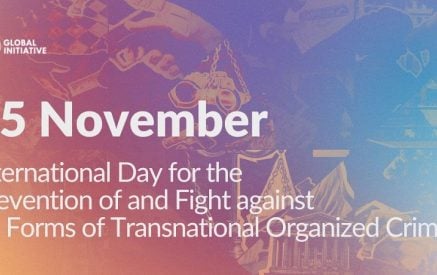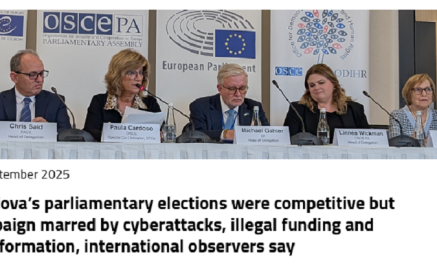Article published at open Democracy
By Doris Barnett (MP, Germany)
When an unidentified pulmonary disease broke out in the metropolis of Wuhan in Central China, most of our countries showed little concern that they would be personally affected. Few of us imagined that this outbreak would grow first into an epidemic and then quickly into a world-encompassing pandemic – and our haphazard approach to developing a coordinated international response is evidence of that initial attitude of indifference.
While most of us are now quarantining and practicing social distancing, this crisis gives us an opportunity to pause and reflect, rethink old habits and prejudices, and adjust them appropriately. As Chair of the economic and environmental committee of the OSCE Parliamentary Assembly – a 323-member body of parliamentarians from North America, Europe and Central Asia, spanning Vancouver to Vladivostok – I hope that principles of solidarity, co-operation and comprehensive security prevail during this period. This means first of all that world leaders should refrain from finger-pointing and blaming the pandemic on one country or another.
Read also
After World War II, the international community came together to build multilateral institutions to prevent another global conflagration and in the subsequent decades we saw a rapidly accelerating process of integration between the world’s economies. In the détente era of the 1970s, the East and West came together to establish the OSCE as a forum for dialogue and confidence-building, much of which was based on economic and scientific co-operation. But economic integration and globalization was not without risks and challenges, and the COVID-19 pandemic is revealing this in all its clarity. Delocalized supply chains and dependence on single suppliers have served well to reduce production costs, but have proved to be high-risk and vulnerable in times of crisis.
Now is the time for us to exert all of our efforts toward ensuring that our countries emerge from this crisis stronger and more effective than before, just as our predecessors did in the aftermath of World War II and during the Cold War. Only together can we limit the spread of the virus and remedy its effects, thereby enhancing security for us all. Regression into national parochialism would be a painful setback for the OSCE participating states and an existential threat to our own organization. Only together will we preserve freedom and prosperity from Vancouver to Vladivostok!
Essential workers
The crisis has also shown us who the essential workers are during troubled times such as these: the common men and women who provide our healthcare, who supply our foodstuffs, who ensure our mobility, who keep our cities and neighborhoods clean, who ensure we have water, electricity and gas – and security on the streets. Once this crisis has passed, we must realize just how valuable they all have been to us, and we must do what we can to ensure significant improvements to their working conditions.
We should already start thinking about what comes after the Great Lockdown, once the pandemic-induced restrictions are lifted. What this might look like for society and the economy no one can yet foresee.
Nevertheless, we OSCE parliamentarians should at least attempt to sketch out our vision of what will need to be done in the coming weeks and months, and articulate a set of principles to follow in our legislative and policy responses:
- Healthcare is a vital and fundamental public service for the societies of our various countries and should be prioritized by our governments.
- Yes to globalization, but only if fair, solidary, sustainable and safe – hence, not at any cost. More thought should be given to national self-sufficiency, especially in healthcare. For reasons of public safety, we should be looking to move some production back home to our countries, without losing sight of good and fair collaboration. The price cannot be the only standard!
- We should look toward restarting and improving international economic relations. Along with investment in our economies, we should not lose sight of environmental and social aspects.
- The global financial system needs to be reassessed and made crisis-safe. In Europe, a whole constellation of mechanisms has been developed and put into place to strengthen the financial system. They provide a solid basis for future improvement.
- Small and medium businesses and the self-employed must not be neglected.
- The artists and cultural workers in our countries should feature prominently in our considerations. In civilized countries, supporting them and incorporating their work in the process of crisis amelioration are matters of the heart.
- Tourism also deserves a place in our deliberations. Tourism helps forge ties of understanding and friendship between nations, and in erasing cultural boundaries. Visas should be streamlined and made easier to obtain.
- Communication at the scientific level is vital to combat future crises. A well-networked scientific community can find solutions more quickly and efficiently. When it comes to patents, public health and wellbeing should have a higher priority than financial considerations. Academic freedom is fundamental to scientific co-operation and must be protected.
- The interdependence between the environment and public health has been made more apparent by the corona crisis. To prevent future pandemics and other public health disasters, it is not enough to merely improve medical infrastructure. A new, comprehensive approach taking all of these factors into consideration is needed.
- New technologies, especially artificial intelligence, have received a significant, worldwide impulse due to the COVID-19 pandemic. They have potential to help massively to mediate the consequences of this crisis and to prevent future ones. But they also involve risks of which we must be aware. This too will call for information-sharing and co-operation.
OSCE Catastrophe Planning Team
Beyond these general principles, we should also think about how to adjust our protocols and improve international coordination mechanisms to respond effectively and quickly to crisis situations. The OSCE, which is founded on the principle of comprehensive security encompassing political-military, economic-environmental and humanitarian dimensions, should consider setting up its own Catastrophe Planning Team, similar to the EU’s European Cluster Collaboration Programme. Periodic exercises and practices involving the responsible individuals would enhance our mutual security. Response plans could be written and periodically tested for validity. Finally, enhancing mutual assistance and support would also serve the causes of peace preservation and security.
Additionally, we must ensure that democratic political structures in our countries are protected and strengthened. We must see to it that our local communities, towns and cities – where government impacts individuals most immediately – are viable and effective.
The people of our countries deserve thanks for their discipline and forbearance during these times. Generosity, solidarity and humanity have distinguished us in this crisis, and we should work to preserve those qualities. We should set about the necessary groundwork, immediately beginning with the unresolved conflicts with which the OSCE still contends. Our first goal should be to bring about an immediate end to all armed conflicts.
Doris Barnett is a member of parliament from Germany and serves as Chair of the OSCE Parliamentary Assembly’s Committee on Economic Affairs, Science, Technology and Environment. Barnett is the Head of the German Delegation to the OSCE PA.
OSCE PA




























































